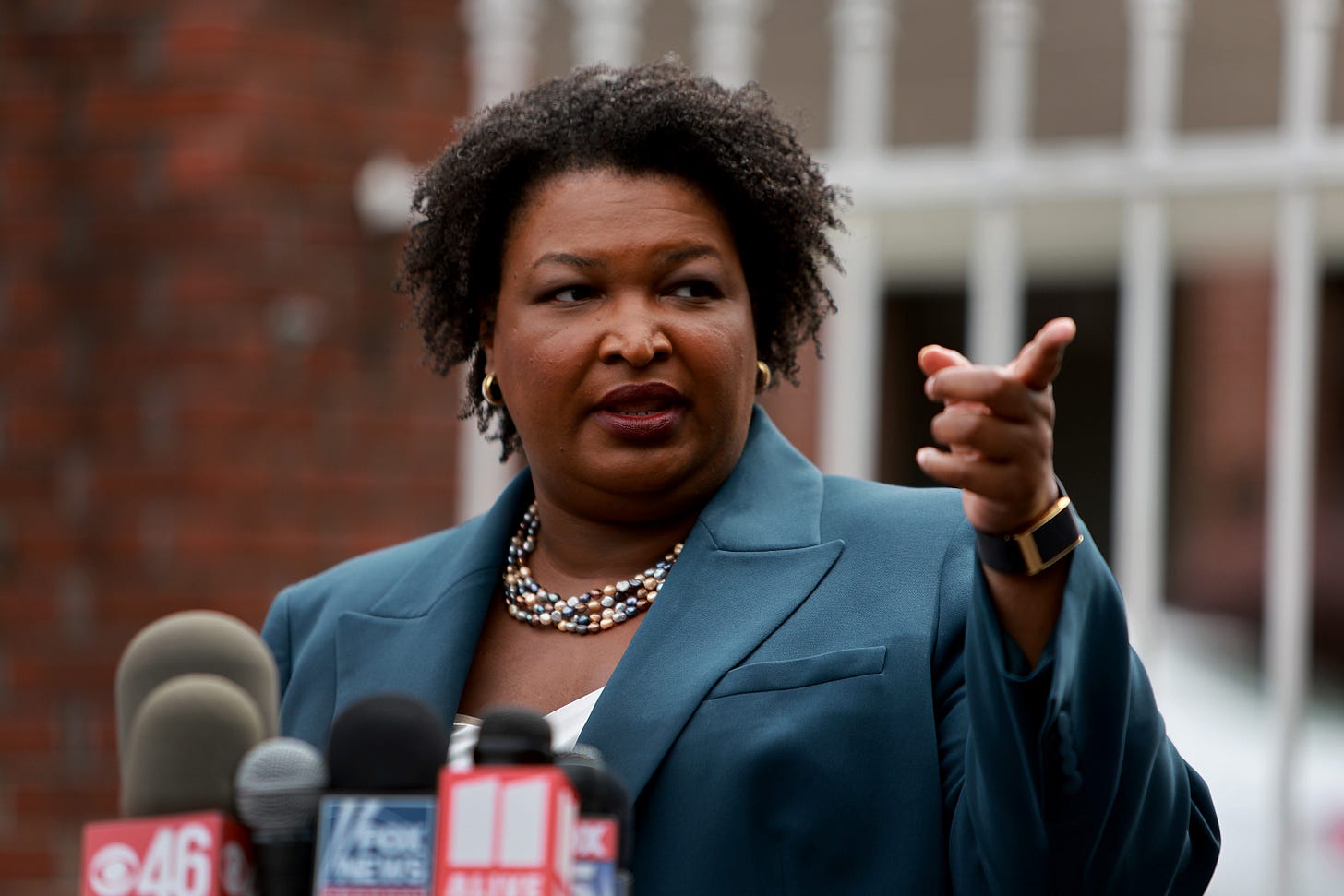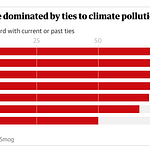
Since joining Rewiring America this month, Stacey Abrams has been trying to educate consumers on the benefits of going electric— and the incentives in the recently-passed Inflation Reduction Act that could help them make the switch.
Conservative media, however, has interpreted this as a Democratic ploy to rip gas stoves out of every household in America. In the last two weeks, Fox News has run at least three articles about two-time former Georgia gubernatorial candidate’s new job at a group that’s “trying to eliminate gas stoves.” The New York Post, Daily Caller, and Daily Wire made similar claims.
The allegations are “a fever dream,” Abrams told HEATED in an interview on Tuesday. While Rewiring America is involved in New York’s push to fully electrify buildings by 2030, the group is not trying to ban gas stoves throughout America. The majority of its advocacy promotes choosing to go electric—primarily by touting the financial and health benefits of doing so.*
”This isn't about taking away someone's opportunities. It's not about stripping away freedom,” she said. “It's about guaranteeing that freedom is real, and not just an idea. And you can go down to your hardware store and get it done tomorrow.”
If you actually talk to Abrams, you’ll find she’s actually quite hesitant to outright bash gas stoves or fossil fuels. “I want us to be able to have this conversation everywhere, and have it with everyone,” she said. “That's not to avoid the harder conversations—but lecturing does not change behavior. What changes behavior is understanding how things benefit you, and understanding that this is not a zero-sum game.”
Ultimately, Abrams said she wants to help with the clean energy transition—not only by helping others make different choices, but by making different choices for herself. She freely admits that she has a gas stove. But she recently purchased her first induction hot plate, she said, and enjoying to process of learning how to cook with it. It’s called the energy transition for a reason.
To convince consumers to join her in the transition, Abrams wants them to know this: “That there are thousands of dollars that are available to go electric in your house, and that those machines can make your home more comfortable, cheaper to operate, and can improve your indoor air quality, can make cooking easier, can make it cooler in the summer, and warmer in the winter.” Electrification is also one of the most important paths to slowing climate change—a crisis that Abrams knows a good deal about.
In our full interview with Abrams, we dive deeper into her personal and professional experience with climate change; details of the electrification incentives in the IRA; the potential challenges with ensuring equity in electrification; and her views on the role of fossil fuels in a net zero future. We also discuss how Abrams’s love of sci-fi influences her imagination of the future.
That full interview—both transcript and audio—is available to paid subscribers only. That transcript is below, and audio is at the top.
If you’re a free subscriber, don’t fret: the first part of our interview is available for you via audio at the top, and transcript at the bottom.
*A previous version of this story incorrectly described Rewiring America’s involvement in gas ban regulations. HEATED regrets the error.
Full Q&A with Stacey Abrams
This interview has been lightly edited for clarity.
Emily Atkin: There seems to be a misconception that you are pushing to ban gas stoves. Could you tell me a little more about what the work that you’re actually doing at Rewiring America entails?
Stacey Abrams: I joined Rewiring America because I think they are making a significant and vital contribution to how people have the choice to improve their lives. One of those choices is to electrify.
Often, that choice sounds great until you realize you don't have the ability to exercise that choice. But because of the Inflation Reduction Act—because of the extraordinary work Rewiring America did to ensure that individuals that consumers actually reap the benefit, as well as industry—we have the opportunity to marry choice and opportunity together.
You can decide that you want to upgrade your appliances, upgrade your car, upgrade your home, and you can afford to do it. That's what this conversation is about. That's what this movement is about: making sure that families, that individuals, that renters and homeowners actually have the freedom to make the choices real. This isn't about taking away someone's opportunities. It's not about stripping away freedom. It's about guaranteeing that freedom is real, and not just an idea. And you can go down to your hardware store and get it done tomorrow.
Emily Atkin: So this is not a secret plan to strip the gas-powered appliances out of every household in America, is what you're saying.
Stacey Abrams: That would be a fever dream.
I will say this: We can make light of it, but I think it's an important point. The fear that seems to be driving this narrative presumes that people aren't able to make the best decisions for themselves and their families. And that's disappointing. It's disappointing to me that there are folks who would deny you freedom because they're afraid of the choice you would make.
Fundamentally, as someone who is an advocate for democracy, I want everyone to be able to vote. Wanting someone to choose what you choose is good. But the most important piece, and what should be driving everyone, is the freedom to make the best choices possible. The freedom to improve your life, the freedom to have more money in your wallet. And the fear-mongering that is trying to intervene in and stop those choices should be concerning to everyone, because those are the very same people who love to use the word “freedom,” but don't seem to want to offer it to consumers in this in this moment.
Emily Atkin: You mention your advocacy for democracy. That's how probably most of our readers know you. I think it might be surprising for some of them to see you make the jump to a climate change organization.
But we did our research: we know that you interned at the EPA in the 90s, wrote your senior thesis on environmental justice, have produced reports about climate change and climate policy obstruction, and it seems like you also have personal experience with climate change, with your parents’ church being the local shelter after Hurricane Katrina.
So I'm wondering, how has your understanding of climate change shifted through all of that experience working on climate change? What has really been the trajectory for you to get here?
Stacey Abrams: I've never seen a division in my interest in climate action, my fight for democracy, my engagement in voter protection, and the work I do in my daily life. I want people's lives to be better. I believe in abundance. I believe that we should have the ability to make choices that improve who we are and improve what we want.
When you don't have the ability to make decisions because you don't have the resources; because you live in a community that has been zoned in such a way that breathing is a luxury, and not a given; when you don't have the ability to escape a natural disaster because your community has been under-resourced— those are not simply existential issues, they're also democracy issues, and climate action is part and parcel of this conversation.
I grew up on the Gulf of Mexico, in Gulfport, Mississippi. Moved to Georgia, came of age here. My parents then returned to Mississippi, where they were pastors, and my mother's church in Hurricane Katrina was ground zero for recovery for what were called “bedroom communities” to the Gulf Coasts. They were communities that were decimated, but because they weren't on the coast—because they weren't directly tied to the more popular and wealthier parts of the state—they were left out and left behind.
I watched in real time as my parents tried to mitigate that distance: Not just the physical distance, but the distance from resources, because they couldn't escape. They couldn't leave when the call came out because they didn't have the resources to do so. We're going to see that happen more and more frequently across this country, and we are going to see more and more people have to make sharp, hard choices. I want to make those choices easier. I want to make them accessible and real. And one of the ways you do that is by reducing the cost for making those decisions.
Emily Atkin: I think that's a really good segue into Arielle’s questions, actually.
Arielle Samuelson: Yes. I am a bit of a data nerd, so I went on the Rewiring America site and used the Inflation Reduction Act calculator to see how much I could save if I switched to electric.
What really struck me is that rebates for items like an electric cars, for a new one, are $7,500. For a used car, it’s only $4,000. Whereas the full price for the item is somewhere between $30,000 and $40,000. And that's before you add in a charging station, and things like the fees that some states are now charging just to switch to renewable energy.
So my question is, can you really promise affordability for these families without additional policy changes? And in general, is it reasonable to assume a low-income family can afford these upgrades?















